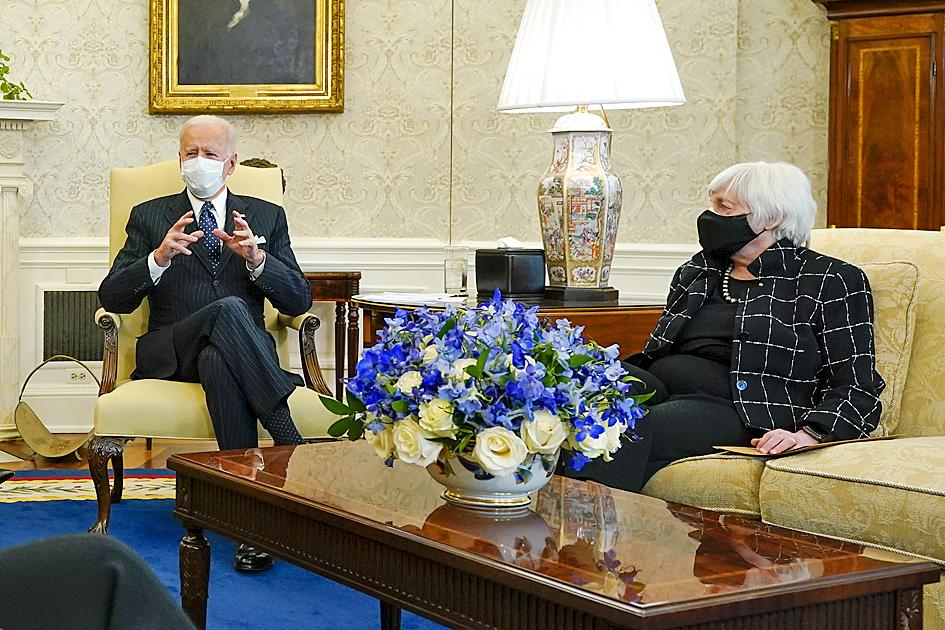US Treasury Secretary Janet Yellen stressed the need for the G7 countries to “go big” with fiscal stimulus to support economic recovery from the global pandemic.
In her first call with foreign counterparts and central bankers from the G7, Yellen said that “the time to go big is now” and that the group should focus on how to help the economy, the US Treasury Department said in a statement after the virtual meeting held on Friday.
The online gathering of finance chiefs from the world’s top industrial economies addressed a proposed expansion in the IMF’s lending firepower along with digital taxation and climate change.

Photo: AP
The US is leaning toward backing an increase in the IMF’s special drawing rights, or SDRs, by as much as US$500 billion, Bloomberg News reported earlier this month. The fund has been lobbying for more help to support developing nations against the COVID-19 crisis.
The G7 discussed increasing the IMF’s resources during Friday’s call, and the group expects a decision to be announced later this month on the back of a G20 discussion, according to one person familiar with the matter. The finance ministers’ goal in Friday’s talks was to build momentum around helping developing nations, the person said on the condition of anonymity.
UK Chancellor of the Exchequer Rishi Sunak, who hosted the virtual meeting, also stressed the importance of the G7 “shaping support for vulnerable countries,” according to a statement from his office.
The US has a de facto veto in the IMF on the decision, and former US Treasury secretary Steven Mnuchin had previously blocked the fund’s requests to boost its special drawing rights.
Yellen highlighted in the call that there is a new tone out of Washington. The US “places a high priority on deepening our international engagement and strengthening our alliances,” she said, according to the Treasury’s statement.
On fiscal policy, the US is among the most aggressive, with the Biden administration pursuing a US$1.9 trillion package in Congress. French Finance Minister Bruno Le Maire said the world’s biggest economies must coordinate stimulus plans and policies in an effort to reduce key risks including trade tensions and inequality.
The finance chiefs also discussed the continuing effort to find international consensus on taxing Internet giants such as Facebook Inc.
Japanese Finance Minister Taro Aso told reporters that given how Friday’s talks went there’s an increasing possibility of a compromise on the international taxation issue. US and European officials have shifted their positions in recent months, he said. Aso said he previously thought that getting a conclusion by mid-2021 was almost impossible.
The group will hold another meeting next month, Aso said.
Biden “believes the largest corporations should pay their fair share in taxes,” White House Press Secretary Jen Psaki said on Friday at a briefing. She said Biden is “committed” to reaching a multilateral agreement.
The UK underlined its commitment to progress on the tax challenges of the digital economy, and called on the G7 to work toward reaching an enduring multilateral solution by the deadline of the middle of this year agreed by the G20, the UK Treasury said.
Talks on digital taxation have been held under the rubric of the Paris-based Organisation for Economic Co-operation and Development.
“We have to come to an agreement this summer,” on the matter, Le Maire said, according to the French finance ministry.

NEW IDENTITY: Known for its software, India has expanded into hardware, with its semiconductor industry growing from US$38bn in 2023 to US$45bn to US$50bn India on Saturday inaugurated its first semiconductor assembly and test facility, a milestone in the government’s push to reduce dependence on foreign chipmakers and stake a claim in a sector dominated by China. Indian Prime Minister Narendra Modi opened US firm Micron Technology Inc’s semiconductor assembly, test and packaging unit in his home state of Gujarat, hailing the “dawn of a new era” for India’s technology ambitions. “When young Indians look back in the future, they will see this decade as the turning point in our tech future,” Modi told the event, which was broadcast on his YouTube channel. The plant would convert

‘SEISMIC SHIFT’: The researcher forecast there would be about 1.1 billion mobile shipments this year, down from 1.26 billion the prior year and erasing years of gains The global smartphone market is expected to contract 12.9 percent this year due to the unprecedented memorychip shortage, marking “a crisis like no other,” researcher International Data Corp (IDC) said. The new forecast, a dramatic revision down from earlier estimates, gives the latest accounting of the ongoing memory crunch that is affecting every corner of the electronics industry. The demand for advanced memory to power artificial intelligence (AI) tasks has drained global supply until well into next year and jeopardizes the business model of many smartphone makers. IDC forecast about 1.1 billion mobile shipments this year, down from 1.26 billion the prior

People stand in a Pokemon store in Tokyo on Thursday. One of the world highest-grossing franchises is celebrated its 30th anniversary yesterday.

Zimbabwe’s ban on raw lithium exports is forcing Chinese miners to rethink their strategy, speeding up plans to process the metal locally instead of shipping it to China’s vast rechargeable battery industry. The country is Africa’s largest lithium producer and has one of the world’s largest reserves, according to the US Geological Survey (USGS). Zimbabwe already banned the export of lithium ore in 2022 and last year announced it would halt exports of lithium concentrates from January next year. However, on Wednesday it imposed the ban with immediate effect, leaving unclear what the lithium mining sector would do in the